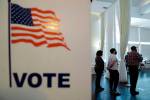Elite anti-Trump Republicans look to … Mitt Romney for hope?
So, let me see if I have this straight.
Republican voters are angry. They’re angry at Democrats, at political correctness, at the slow and inexorable tide of history that has somehow left “their country” unrecognizable to them. And they’re turning in droves to businessman Donald Trump as their answer.
Trump was the running away winner of the Nevada Republican caucus Feb. 23. Voters here said they were angriest about the federal government than were voters in the other early voting states.
A CNN exit poll conducted on Super Tuesday found more than half of all GOP voters in Southern states said they felt “betrayed” by the Republican Party. Focus grouper Frank Luntz found “an abiding distrust — and disrespect for — the governing elite” among Trump supporters, concluding, “Trump voters are not just angry. They want revenge.”
Trump himself has said he could shoot someone on Fifth Avenue and not lose voters. And he doesn’t shy away from acknowledging voter rage, either: “I’m representing a lot of anger out there,” Trump said on CNN’s “State of the Union.” “We’re not angry people, but we’re angry at the way this country’s being run. And a lot of them are angry at the way the Republican Party is being run.”
So against this backdrop, you have Republicans leaders threatening to boycott Trump. Senate Majority Leader Mitch McConnell has said Republicans will drop Trump like a “hot rock” should he win the nomination. Some current and former Republican elected officials say they won’t vote for Trump if he wins the GOP nomination. Elites gather behind closed doors to figure out how to stop Trump.
To quote noted conservative Dick Cheney, “So?”
In fact, it seems to me the more Republican elites come out against Trump, the more inclined Trump supporters are to come to his defense, attend his rallies and — most important of all — vote for him. Their criticism bids up Trump’s credentials as the anti-establishment outsider who will restore luster to the country and cojones to the party.
It might be better for the party to vigorously embrace Trump, to say he represents the values and vision of the modern party and that he will be the ultimate GOP insider when elected. (This may even have the virtue of being true; Trump has said he’ll make deals with Democrats if elected. And that makes at least one of his rivals nervous.)
But the ultimate head-scratcher in Republicans versus Trump is yet to come. Who’s the one person in the entire party who is most qualified to drive angry voters into the arms of a smiling Trump? Who’s the guy whose criticism is most likely to produce an angry regular-person voter backlash? Who’s the guy that will essentially prove the meme among Trump supporters that Republican elites don’t have the best interests of regular joes at heart?
Ladies and gentlemen, I give you Willard Mitt Romney.
The failed 2012 Republican nominee is planning a speech tomorrow, the day of the next GOP debate, in which he’s expected to criticize Trump. That should totally do the trick, right? I mean, there’s virtually no chance Trump will point out that Romney lost the 2008 nomination to John McCain (and we know Trump thinks McCain isn’t a hero!) and the 2012 race to Barack Obama. No one could foresee Trump saying Romney is part-and-parcel of offshoring, outsourcing and downsizing the very jobs that Trump has promised to bring back to America. It’s impossible to picture Trump on stage reminding voters that Romney and his elite country club pals disdain the 47 percent, which includes many people who hate the Republican Party for the very reason that it usually nominates people such as Romney.
Whatever you do, do not choose the word “loser” as your drinking game word while watching Trump’s reaction to Romney’s address!




























